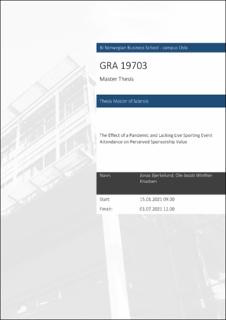The Effect of a Pandemic and Lacking Live Sporting Event Attendance on Perceived Sponsorship Value
Master thesis

View/
Date
2021Metadata
Show full item recordCollections
- Master of Science [1621]
Abstract
Sponsorship as marketing communication measures increased rapidly in popularity
over the last three decades before the turn of the millennium, together with a more
sophisticated marketing industry (Meenaghan, 1998). After that, sponsorship was
viewed as an alternative to more traditional advertising and have taken many different
forms (Lardinoit & Derbaix, 2001; Cornwell, 2019). Since then, sports have been the
dominating domain of the growing market of sponsorship agreements (Woisetschläger,
Backhaus, & Cornwell, 2017). These agreements have been applied by corporate
organizations to reach specific, diverse, and large target audiences with objectives of
creating brand awareness, enhanced brand images, and sales (Lardinoit & Derbaix,
2001; Cornwell & Maignan, 1998). In widely accepted definitions of sponsorship, the
commercial potential of sport entities is accessed and utilized to achieve these
objectives in exchange of rights fees of cash or in-kind (Yang & Ha, 2014; Wakefield,
Wakefield, & Keller, 2020). This study seeks to examine the effect of the impact related
to the pandemic outbreak of a new type of coronavirus in late 2019, with the associated
decease COVID-19, on the sports domain of sponsorship value in Norway. The sport
industry here, was among other industries worldwide, highly affected by this pandemic.
The impact involved several governmental rules, restrictions, and recommendations to
minimize, map, and control spread of the virus, but it also involved the fear of infection
among people (Ahorsu, et al., 2020). For the sport industry, this mainly led to
cancellations and postponements of planned sporting events, closed gyms and training
facilities, and the lack of live sporting event attendance (Donthu & Gustafsson, 2020).
Description
Masteroppgave(MSc) in Master of Science in Strategic Marketing Management - Handelshøyskolen BI, 2021